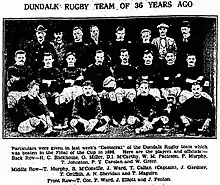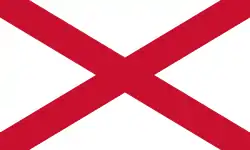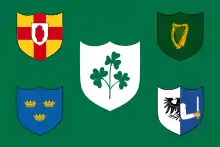Dundalk R.F.C.
Dundalk Rugby Football Club (/dʌnˈdɔːk/) is an Irish Rugby football club from Dundalk, County Louth. Dundalk compete in Division 1A of the Leinster League.
 | ||
| Full name | Dundalk Rugby Football Club | |
|---|---|---|
| Union | Leinster | |
| Nickname(s) | The Hoops | |
| Founded | 1877 | |
| Location | Dundalk, County Louth, Ireland | |
| Ground(s) | Mill Road (Capacity: 1,000) | |
| Chairman | Darren Crilly | |
| President | John McKevitt | |
| Director of Rugby | Adam Doyle | |
| Captain(s) | Jonathan Williams | |
| League(s) | Leinster League Division 1A | |
| 2020–21 | N/A (season abandoned) | |
| ||
| Official website | ||
| www | ||
Dundalk first formed in 1877 and joined the Provincial Towns Union, which merged into what became the Northern Branch of the Irish Rugby Football Union. The club later joined the Leinster branch of the IRFU. It has been a junior club throughout its existence, with the exception of the 2015–16 season when it competed in Division 2C of the All-Ireland League.
The club's first honour was a Leinster Junior Cup victory in 1908–09. They won their first Leinster Towns Cup in 1931–32 and have won the competition ten times, with the most recent victory coming in 2010–11. They have been Leinster League Division 1 winners twice, in 1994–95 and in 2014–15.
The club moved to its present home ground at Mill Road in 1967, having previously played at Ballymascanlon. In earlier years, matches were played at a number of grounds in the town, including the grounds at Dundalk Grammar School, the Polo Field, Mount Avenue, and the Athletic Grounds. The team has played in black and white hooped shirts with white or black shorts since its reformation in 1906. The club's crest is based on the town's coat of arms.
History

Dundalk R.F.C. was established as 'Dundalk Football Club' in 1877. It is known that the club was established that year because of a report of its "first annual meeting" appearing in the Dundalk Democrat of 5 October 1878.[1] The first non-practice match that they are known to have played was the visit of Dublin Wanderers on 8 March 1878, which was played in the Pigeon House Field (a division of the Demesne).[2] They joined the Provincial Towns Rugby Football Union alongside Armagh, Bessbrook, Derry, and Dungannon. This union then voted to become a branch of the Irish Rugby Football Union in 1884.[3] During the 1880s and 1890s, Dundalk (and another club formed at the Great Northern Railway works in the town) competed in the Provincial Towns Cup (the competition that later became the Ulster Towns Cup, and not the Leinster-based competition of the same name).[4]
The club was elected a member of the Leinster Branch of the IRFU on 11 January 1892,[5] but continued to compete in the Ulster-based Provincial Towns Cup. They reached the final for the first time in 1894–95 when they were defeated by Dungannon.[6] With the appearance of a Dundalk association football club about this time, the rugby club started to be known as 'Dundalk Rugby Club' or 'Dundalk R.F.C.' to differentiate it from Dundalk A.F.C.[7] By the turn of the 20th Century, rugby had lost popularity in the town,[8] and in 1903 the G.N.R. club switched codes to association football while Dundalk R.F.C. became dormant. The club was revived in 1906 under the presidency of Henry Church Backhouse, adopted colours of black and white striped shirts, and moved to play in Leinster competition exclusively.[9] They won their first honour in the 1908–09 season when they defeated St Mary's College in a replay to win the Leinster Junior Challenge Cup for the only time.[10] They reached the final again the following year but were defeated by Merrion in a replay.[11]
The club subsequently declined and it did not begin the 1912–13 season, most likely because of a lack of playing members. Led by the efforts of Frank Corr, it was reestablished in 1922.[12] In 1932, they won their first Provincial Towns Cup (which had been reorganised from the Leinster Junior Challenge Cup in 1925), defeating Longford on a 7–0 scoreline at Lansdowne Road.[13] They contested 10 more finals between 1936 and 1949, winning six including a three-in-a-row between 1947 and 1949. The rugby team's 1949 Towns Cup victory was nearly part of a unique sporting treble for the town that weekend, with Dundalk F.C. winning that season's FAI Cup final the next day. But in Gaelic football, Louth were defeated in the National League final.[14]
Dundalk also won the Ryan Cup (a competition discontinued in the 1940s) twice during this period—in 1934–35 and again in 1936–37. The latter victory resulted in a 'cup double' for the club to go with that season's Towns Cup win. But the 1937 final became notorious subsequently because the IRFU had attempted to postpone it but apparently did not tell the two teams competing—Dundalk and Birr. Both teams turned up at Lansdowne Road on the day but no match referee was present. The match went ahead with the president of the Dundalk club taking charge, but it was ended by an IRFU official after 50 minutes with Dundalk leading 7–0 because the same day's Bateman Cup final was due to start.[15] The 1950s and 1960s were comparatively lean for Dundalk with no further appearances in a Towns Cup decider.[16]
They moved to their present home ground at Mill Road in 1967 and the official opening came two years later after a £20,000 investment in the pitches and a new pavilion.[17] That season, 1969–70, they reached the Towns Cup final for the first time in 21 years and defeated Navan, 8–3, to win the Cup for the eighth time.[18] Another lean period followed with no appearances in the final until they won a ninth Towns Cup success in 1987, with a 13–6 victory over Kilkenny.[19] The club again went through a long lean period in the competition, with only a losing final appearance in 2000 before they won the Cup for the tenth time in 2011, with a 35–20 victory over Tullamore.[20]
For most of the club's existence, junior rugby clubs arranged friendly matches around the annual provincial towns' cup competitions. After the creation of the All-Ireland League (AIL), the IRFU formed leagues for junior sides. The Leinster League was formed in 1994–95, and Dundalk were the inaugural winners of the Division One title.[21] At that time there was no automatic promotion pathway to the AIL. They did not win the Leinster League title again until they finished top of Division 1A in 2014–15 under player-coach Ene Fa'atau (brother of Samoa international Lome Fa'atau). This win ensured qualification for a 'round robin' tournament between the four provincial league winners, in which two clubs would be promoted to the All-Ireland League Division 2C for 2015–16. Dundalk defeated De La Salle Palmerstown 22–10 to secure promotion, thus becoming a 'senior' club for the first time.[22] The same season they won the All-Ireland Junior Cup for the first time, defeating Bangor in the final, 55–5.[23] Fa'atau left at the end of the season and in their first season in the All-Ireland League, Dundalk struggled to compete and were relegated to Leinster League Division 1A again for 2016–17.[24]
Colours and crest
Dundalk's colours have been black and white hooped shirts with white shorts and black and white socks since the club was reformed in 1906. Black shorts instead of white were first introduced in the 1990s.[9]
The club badge consists of the coat of arms of the town of Dundalk emblazoned on a silver badge with the club name and year of establishment. The Coat of Arms of Dundalk was officially granted by the Office of the Chief Herald at the National Library of Ireland in 1968, and is a replication of the Seal Matrix of the 'New Town of Dundalk', which itself dates to the 14th Century.[25]
Home grounds
The club has had a number of home grounds during its history. At first, it played at the Pigeon House Field at the Demesne then, in the late 1800s, it mostly played at the grounds of the Dundalk Educational Institution (now Dundalk Grammar School) or the Dundalk Athletic Grounds. The Athletic Grounds were owned and rented out by the Dundalk Young Ireland's Athletic Grounds Company for cricket, Gaelic games, and athletics, as well as football and rugby. When the club reformed in 1906, it opted for the Polo Field—another division of the Demesne.[9] After being re-established in 1922, the club again played at the Grammar School Grounds then moved to Mount Avenue before the end of the decade. It remained there for the 1930s before returning to the Athletic Grounds for most of the 1940s and 1950s. After the closure of the Athletic Grounds in 1960, the club based itself at the grounds of the Ballymascanlon House Hotel until it secured land of its own at Mill Road in 1967 when Club President Don McDonough bought 17 acres of land. The official opening took place in September 1969 when the local side played a Wolfhounds XV.[17] Floodlights were first installed at the ground in 1972.[26]
Rivalries
Dundalk have played an annual pre-season friendly against Belfast club Church of Ireland Young Men’s Society (CIYMS) R.F.C. since 1947,[27] for which the Lockington Cup is awarded.[28]
The club also played an annual friendly against Portadown called the Rainey Cup from 1961 until 1988. The fixture became intermittent subsequently and was played for the final time in 1996 because of the busier playing schedules caused by the introduction of the All Ireland and provincial leagues in the early 1990s. When the two clubs met in an All-Ireland Junior Cup quarter-final in 2013, the trophy was awarded to the victorious Portadown side but plans to renew the annual contest did not materialise.[29]
The Louth Derby is contested between Dundalk and fellow Leinster League side Boyne R.F.C. from Drogheda.[30][31]
Notable players
- Players capped for Ireland who have played for Dundalk
 Frederick William Kidd (3 caps)
Frederick William Kidd (3 caps) Colm Callan (10 caps)
Colm Callan (10 caps)
Personnel
Club officials
| Name | Role |
|---|---|
| John McKevitt | Club President |
| Darren Crilly | Chairperson |
| Adrian Corcoran, Derek Williams, Denis Cahalane, John Hennessey | Committee Members |
| Alan Byrne | Honorary Treasurer |
| Kathy Cranny | Honorary Secretary |
| Mary Murdock | Media and Communications Director |
| Maurice Murphy | Clubhouse and Grounds Manager |
Source:[32]
First XV honours
- All-Ireland Junior Cup: 1
- 2014–15
- Leinster League: 2
- 1994–95, 2014–15
- Leinster Towns Cup: 10
- 1931–32, 1936–37, 1938–39, 1944–45, 1946–47, 1947–48, 1948–49, 1969–70, 1986–87, 2010–11
- Leinster Junior Challenge Cup: 1
- 1908–09
- Ryan Cup: 2
- 1934–35, 1936–37
References
- "Dundalk Football Club". Dundalk Democrat. 5 October 1878. Retrieved 30 January 2021.
- "Sport and Play". Dundalk Democrat. 23 October 1920. Retrieved 30 January 2021.
- "Rugby Football Union". Belfast Newsletter. 20 November 1884. Retrieved 30 January 2021.
- "Football". Belfast Newsletter. 12 October 1886. Retrieved 4 February 2021.
- "The Leinster Fifteen". Freeman's Journal. 12 January 1892. Retrieved 30 January 2021.
- "Football". Belfast Newsletter. 29 April 1895. Retrieved 4 February 2021.
- "Dundalk Rugby Football Club". Dundalk Democrat. 16 March 1895. Retrieved 30 January 2021.
- "Past Football Days". Dundalk Democrat. 20 August 1898. Retrieved 4 February 2021.
- "Reviving the Game In Dundalk". Dundalk Examiner and Louth Advertiser. 3 November 1906. p. 5.
- "Leinster Junior Cup Re-Play". Sunday Independent. 2 May 1909. Retrieved 31 January 2021.
- "Leinster Junior Cup Final (Replay)". Freeman's Journal. 25 April 1910. Retrieved 5 February 2021.
- "Rugby Football". Dundalk Democrat. 30 September 1922. Retrieved 30 January 2021.
- "Celebrating the Cup Win". Dundalk Democrat. 16 April 1932. Retrieved 5 February 2021.
- "Dundalk's Great Double Win". Dundalk Democrat. 16 April 1949. Retrieved 7 February 2021.
- "Two Teams Get Marching Orders". Irish Press. 26 April 1937. Retrieved 7 February 2021.
- "Club Competitions". leinsterrugby.ie. Retrieved 30 January 2021.
- "Opening of Dundalk Rugby Grounds". Dundalk Democrat. 27 September 1969. Retrieved 30 January 2021.
- "Dundalk Capture Provincial Towns' Cup". Dundalk Democrat. 25 April 1970. Retrieved 31 January 2021.
- "Dundalk take Towns' Cup after epic struggle". Dundalk Democrat. 2 May 1987. Retrieved 31 January 2021.
- Walsh, Daire (25 April 2011). "Dodd's army tops of Towns". Irish Independent. Retrieved 31 January 2021.
- "DUNDALK FIRST WINNERS". Dundalk Democrat. 21 January 1995. Retrieved 31 January 2021.
- "WILLIAMS HAT-TRICK SEES DUNDALK RFC PROMOTED TO SENIOR RANKS". talkofthetown.ie. Retrieved 30 January 2021.
- Bradley, Jonathan (2 February 2015). "Bangor just blown away in final defeat to Dundalk". belfasttelegraph.co.uk. Belfast Telegraph. Retrieved 31 January 2021.
- "Towns Cup specialists driven by taste of AIL". independent.ie. Retrieved 4 February 2021.
- "Coat of Arms (crest) of Dundalk". heraldry-wiki.com. Retrieved 23 June 2019.
- "Rugby". Dundalk Democrat. 28 October 1972. Retrieved 7 February 2021.
- "Rugby". Dundalk Democrat. 4 January 1947. Retrieved 6 February 2021.
- "CIYMS: A History". ciyms.com. Retrieved 6 February 2021.
- Mulligan, Richard (26 November 2013). "PORTADOWN 15 DUNDALK 12". Belfast Newsletter. Retrieved 7 February 2021.
- "Dundalk/Drogheda rivalry rears head". The Argus. 24 March 2010. Retrieved 13 May 2019 – via independent.ie.
- "Dundalk RFC score big victory over derby rivals Boyne". Dundalk Democrat. 12 March 2019. Retrieved 6 February 2021.
- "Executive Committee" (PDF). dundalkrfc.ie. Retrieved 6 February 2021.